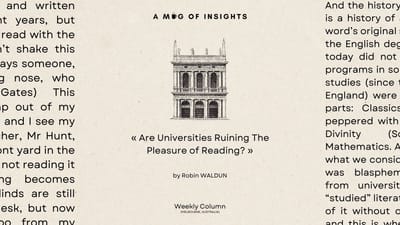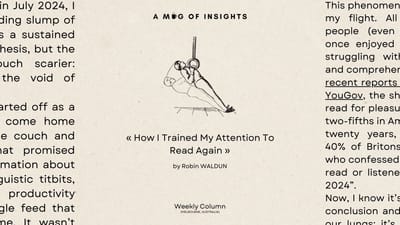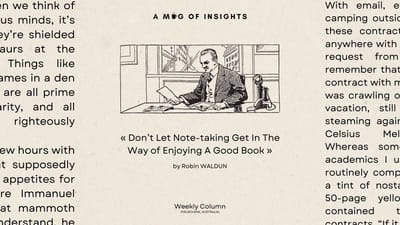The Curse of the Well-Read Mind

Welcome to the weekly column from A Mug of Insights' new home! From now on, I'll dispatch these letters on Saturdays, and paid subscribers will receive their 1-2-Read letters on Mondays. If you like what you're reading, consider upgrading to the Grande tier for journal prompts and a practical exercise every week to strengthen your reading muscles! Thank you for reading, and I look forward to seeing you next week.
Let’s pick up where we left off last week: the trap of being a bookful blockhead.
Just as a quick recap. Last week, covered the basic learning loop: default position, consultation, experimentation, remembering, and ended on a note of caution for people who are stuck, trying to know everything before they experiment.
I’m one of these people, and in fact, back when I was in Year 10, I had this fantasy of reading everything I needed to know about life so that I wouldn’t make any mistakes. And surprise, surprise, I still made the same mistakes, ate the same shit sandwiches and did everything the books told me not to do. This inspired a new way of thinking about reading. I began to sense that perhaps knowing isn’t enough, and in some cases, it could do more harm than good.
The traps for know-it-alls
Bring someone to mind who’s a know-it-all in your life. Yep, you’re rolling your eyes, wishing that they would shut up and let everyone enjoy a good meal. But as annoying as this person is, we have to admit that they are (on some level) smart as hell. They have a solution for every mistake we’ve made, an explanation for everything we find confusing and unsolicited advice for every breath we take.
But then, we hear through the grape vines that this person is in six-figure debt, has nightly squabbles with his girlfriend and has never drum-cleaned his washing machine. Huh? But he’s smart, right?!
Yes, but smart people are usually the first ones to dive head-first into one of these 4 traps. Let’s use drum-cleaning a washing machine as a simple example.
Trap 1: Paralysis
The smart person, unlike our dumbasses, lives through ideas. A drum clean is never just a drum clean, but it’s researching what it means, how it works, the chemical processes behind the clean and the brand that’s the best for doing this job. He builds a mental model of doing the thing long before he drives to Target, and every daily task turns into a research project.
You then hear from his girlfriend that he spent six months deciding which vacuum cleaner to buy, three weeks on finding the perfect dishwashing tablet and one entire week on picking out a shirt for a dinner. On paper it looks deliberate, but over time, it really starts to weigh on the smart person because he’s in the habit of overthinking way before he acts. This is the trap of paralysis, and it comes from a deep fear of making mistakes.
Trap 2: Fear of mistakes
The smart person avoids mistakes like his life depends on it. He’s afraid of picking the wrong brand of drum cleaner, and so far, he’s working through his 3rd YouTube video on how to do a cleaning cycle.
To him, stupid people like us are doing things wrong because we’re constantly making mistakes. He chastises me for getting a refund on a camera lens I didn’t like and roasts a co-worker for paying a cancellation fee on her therapy session. Now that he’s on a pedestal, he can’t afford to slip up, not even once.
But what he doesn’t understand is that fucking up is a part of learning. Sometimes, experiments will go wrong because our ideas don’t always match up with how things work. So, I’ve learned to rent a lens before I buy it, and my co-worker learned to call her therapist 48 hours before their sessions. We’ve moved on, while he’s still stuck on his 4th YouTube video on the drum clean. This amount of research without any experimentation will eventually lead to an ugly place: paranoia.
Trap 3: Paranoia
Finally, he drives to Target to get those drum cleaning tablets. He has a Post-it note with the brand name, no. of tablets per box, and even the scent all written down. He takes a turn into the toiletry section, and a slender, freckled, brunette young man greets him:
“Hi, sir, can I help you with anything?”
He presents the note like a senior citizen. The young man looks at it, checks the stock on his inventory scanner and shakes his head. “We don’t have that in stock, unfortunately. But this one here,” he bends down and picks up a box from another brand, “they all work the same, and this is slightly cheaper.”
Now, most of us would’ve said thank you and moved on. Not the smart person. He rejects the recommendation and insists that he needs the exact brand. After all, he cannot let all that research go to waste, and he has to be right. He is always on guard in case reality proves his theory wrong, because he’s afraid of a single mistake. This is the fear of mistakes on full display, and if left unchecked, it’ll turn ugly real fast.
Trap 4: Critique
Bring to mind a critic. What do you see? A crank, a crackpot or a pedant? The point is, we know what they look like without knowing what they look like, and they’re the type you don't want around for a Friday dinner.
Now, the fear of mistakes and paranoia, if left unchecked, will ossify into a critical/cranky attitude towards life. The drum clean is just one instance, but what if we add in buying a new shirt, planning a trip and cooking a meal into the mix? The smart person will build an elaborate theory around every area of life, and he can’t afford to be wrong about any of them. But, when reality inevitably pokes a few holes in his theories, what will he do? That’s right, the smart person doubles down and opposes reality.
This looks like lecturing people about finances while being terrible at budgeting, and it also looks like criticising everything while being self-righteous. He thinks to himself: I criticise things because I know better. But in reality, he’s just being an asshole.
Let’s come back to reading: knowing too much could be bad for you
Don’t worry if you see a piece of yourself in Mr Smart. We all carry a bit of this tendency when we’re reading, so the best we can do is to recognise it and do something about it.
As it turns out, there’s a term for these traps in literary theory called paranoid reading. It describes a style of reading that is too in love with a pet theory that we disregard everything else. Take the common financial advice, the 50-30-20, for example. A normal person would read about it, test it out and decide if it works for them. But a paranoid reader holds the theory as gospel and forces their budget into the 50-30-20 frame even if it doesn’t work. The tail starts wagging the dog because theory is holding experience hostage.
Unfortunately, this tendency is very common for academic types, giving us that stereotype of a brilliant mind who can’t tie his shoelaces. This is because pure academic learning rewards building the perfect theory, and if we’re stuck writing papers all day long in isolated seminar rooms, we’ll face no resistance from reality and think that our ideas are universal.
In Byung-Chul Han’s The Agony of Eros, he argues that theories that don’t clash with reality aren’t good at all because “thinking withers into mere work (Han 47)". In contrast, good ideas invite challenges and experiments, and it’s always open to change. “Strong theories”, writes Han, “[represent] an essential decision that causes the world to appear wholly different.” It transforms how we see the world and encourages us to experiment because it doesn’t need to defend itself.
So, what’s the solution?
The solution is very simple: learn just enough and lean into experimentation and trust that reality will give you feedback. Let go of the fear of making mistakes, because it’s the fastest way to learn, and also get comfortable with discarding the ideas that no longer work for you, no matter how perfect they sound on paper.
But what if you’re reading something that is only theoretical with no practical applications (a philosophy book or a history book)? The same idea applies. Notice that a lot of people love to debate over details when they’re reading a theory-heavy book: he didn’t mean a in b! You don’t understand x! But, just like how Wittgenstein asked, “What is your aim with philosophy?” The Answer? “To show the fly the way out of the fly bottle.”
We need to actively look for moments when a theory fundamentally alters how we see the world and live the idea in practice. In a strange way, the most theoretical books are the most practical, because they change the fabric of who we are, how we process reality and the decisions we make. Recently, a book on grammar completely changed how I communicate in writing and conversation, and reading Han’s The Agony of Eros flipped my view of love upside down.
Sometimes, these revelations are way more valuable than debating over pedantic details. And despite what those academics say, refusing to play semantics isn’t a sign that you’re less intelligent. Quite the opposite. It’s a sign that you know how to use reading for what it’s supposed to do: inform us and liberate us into a better way to look at the world, a better way to act in the world and a mind attuned to wisdom.
That’s all for this week. Next week, we’ll tackle some specific genres and show you how to connect the abstract with the concrete. Thanks for reading!
Until next week
Robin
Subscribe to my newsletter to get the latest updates and news




Member discussion